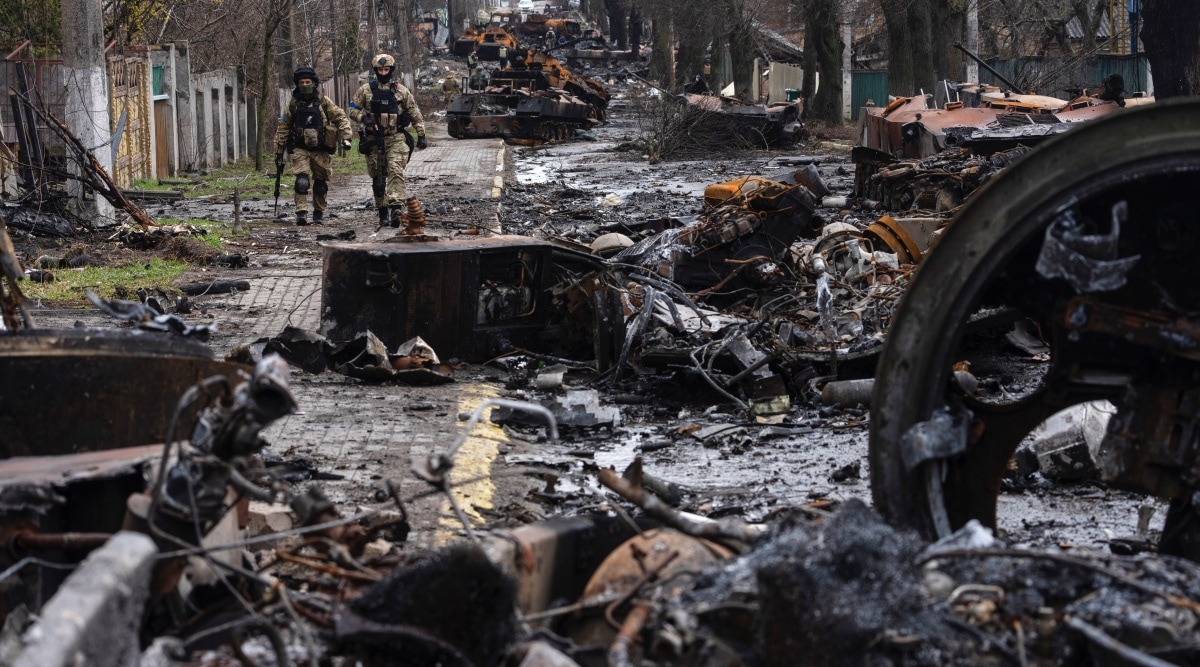 Soldiers walk amid destroyed Russian tanks in Bucha, on the outskirts of Kyiv, Ukraine, April 3, 2022. (AP)
Soldiers walk amid destroyed Russian tanks in Bucha, on the outskirts of Kyiv, Ukraine, April 3, 2022. (AP)Russia Ukraine War Crisis Live: The UN General Assembly is set to vote Thursday on whether to suspend Russia from the UN’s premier human rights body. The move was initiated by the United States after hundreds of bodies were found strewn on the streets of Bucha following the withdrawal of Russian troops near the Ukrainian capital Kyiv, AP reported.
Meanwhile, the Mayor of Mariupol put the number of civilians killed there at more than 5,000 Wednesday, as Ukraine collected evidence of Russian atrocities on the ruined outskirts of Kyiv and braced for what could become a climactic battle for control of the country’s industrial east, according to AP.
The United States on Wednesday announced a new round of sanctions targeting Russian financial institutions, as well as Kremlin officials and their family members, following mounting global accusations of Russian war crimes in Ukraine, Reuters reported. The measures include banning new investment in Russia, sanctioning Russian President Vladimir Putin’s adult children and Russian Foreign Minister Sergei Lavrov’s family members. A senior administration official told reporters that if Putin were to change course in Ukraine, sanctions could slow and possibly reverse.
 Burned column of military vehicles are seen on a highway, as Russia's attack on Ukraine continues, in Kyiv region, Ukraine, April 5, 2022. (REUTERS/Gleb Garanich)
Burned column of military vehicles are seen on a highway, as Russia's attack on Ukraine continues, in Kyiv region, Ukraine, April 5, 2022. (REUTERS/Gleb Garanich)

US Treasury Secretary Janet Yellen said on Wednesday that Russia should be expelled from the Group of 20 major economies forum, and the United States will boycott "a number of G20 meetings" if Russian officials show up.
Her comments at a US House Financial Services Committee hearing raised questions about the G20's future role in the wake of Russia's invasion of Ukraine.
Since 2008, the club has served as a key international forum for issues from Covid-19 relief to cross-border debt and also includes China, India, Saudi Arabia and other countries that have been reluctant to condemn Russia's actions. Yellen told lawmakers Russia's invasion of Ukraine and the killings of civilians in Bucha "are reprehensible, represent an unacceptable affront to the rules-based global order, and will have enormous economic repercussions in Ukraine and beyond."
The United States and its key allies have placed greater emphasis in recent months on the G7 grouping of industrial democracies, whose interests are more aligned, using G7 meetings to coordinate their response to Russia's war in Ukraine. (Reuters)
The UN General Assembly will vote Thursday on whether to suspend Russia from the UN's premier human rights body. The move was initiated by the United States in response to the discovery of hundreds of bodies after Russian troops withdrew from towns near the Ukrainian capital Kyiv, sparking calls for its forces to be tried for war crimes.
US Ambassador Linda Thomas-Greenfield made the call for Russia to be stripped of its seat on the 47-member Human Rights Council in the wake of videos and photos of streets in the town of Bucha strewn with corpses of what appeared to be civilians. The videos and reporting from the town have sparked global revulsion and calls for tougher sanctions on Russia, which has vehemently denied responsibility. (AP)
The mayor of the besieged port city of Mariupol put the number of civilians killed there at more than 5,000 Wednesday, as Ukraine collected evidence of Russian atrocities on the ruined outskirts of Kyiv and braced for what could become a climactic battle for control of the country's industrial east.
Ukrainian authorities continued gathering up the dead in shattered towns outside the capital amid telltale signs Moscow's troops killed civilians indiscriminately before retreating over the past several days. In other developments, the US and its Western allies moved to impose new sanctions against the Kremlin over what they branded war crimes.
And Russia completed the pullout of all of its estimated 24,000 or more troops from the Kyiv and Chernihiv areas in the north, sending them into Belarus or Russia to resupply and reorganize, probably to return to the fight in the east, a US defense official speaking on condition of anonymity said. (AP)
One of the world’s most derided visions of international affairs is Samuel Huntington’s infamous “Clash of Civilisations”. Huntington saw the state of the post-Cold War conflict as chiefly being between civilisational complexes that had shared history, geographic contiguity and a common culture. He argued that the primary axis of future conflict would be cultural fault lines between civilisations rather than between political ideologies.
Huntington mapped civilisations largely in line with geographically clustered ethno-religious groupings. For example, he predicted (in 1993) that the Islamic world would be the Western culture’s chief antagonist, the likelihood of a Sino-Islamic alliance, and positioned India (“Hindu” culture) and Russia (“Orthodox” culture) as “swing civilisations”. It is particularly interesting to dust off Huntington’s pages and revisit his predictions regarding Russia and India. Most importantly, he also identified Ukraine as a unique “cleft” between civilisations due to the linguistic and religious divide between western and eastern Ukraine. Read more.